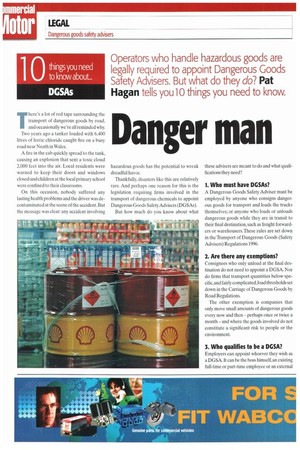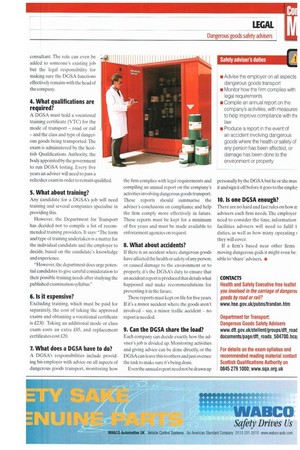Danger man
Page 40

Page 41

If you've noticed an error in this article please click here to report it so we can fix it.
Operators who handle hazardous goods are legally required to appoint Dangerous Goods
Safety Advisers. But what do they do? Pat Hagan tells you 10 things you need to know.
There's a lot of red tape surrounding the transport of dangerous goods by road, and occasionally we're all reminded why Two years ago a tanker loaded with 6,400 litres of ferric chloride caught fire on a busy road near Neath in Wales.
A fire in the cab quickly spread to the tank, causing an explosion that sent a toxic cloud 2,000 feet into the air. Local residents were warned to keep their doors and windows closed and children at the local primary school were confined to their classrooms.
On this occasion, nobody suffered any lasting health problems and the driver was decontaminated at the scene of the accident. But the message was clear: any accident involving hazardous goods has the potential to wreak dreadful havoc.
Thankfully, disasters like this are relatively rare. And perhaps one reason for this is the legislation requiring firms involved in the transport of dangerous chemicals to appoint Dangerous Goods Safety Advisers (DGSAs).
But how much do you know about what these advisers are meant to do and what qualifications they need?
1. Who must have DGSAs?
A Dangerous Goods Safety Adviser must be employed by anyone who consigns dangerous goods for transport and loads the trucks themselves; or anyone who loads or unloads dangerous goods while they are in transit to their final destination, such as freight forwarders or warehousers. These rules are set down in the Transport of Dangerous Goods (Safety Advisers) Regulations 1996.
2. Are there any exemptions? Consignees who only unload at the final destination do not need to appoint a DGSA. Nor do firms that transport quantities below specilic, and fairly complicated, load thresholds set down in the Carriage of Dangerous Goods by Road Regulations.
The other exemption is companies that only move small amounts of dangerous goods every now and then — perhaps once or twice a month — and where the goods involved do not constitute a significant risk to people or the environment.
3. Who qualifies to be a DGSA? Employers can appoint whoever they wish as a DGSA. It can be the boss himself, an existing full-time or part-time employee or an external
consultant. The role can even be added to someone's existing job but the legal responsibility for making sure the DGSA functions effectively remains with the head of the company.
4. What qualifications are required?
A DGSA must hold a vocational training certificate (VTC) for the mode of transport road or rail and the class and type of dangerous goods being transported. The exam is administered by the Scottish Qualifications Authority, the body appointed by the government to run DGSA testing. Every five years an adviser will need to pass a refresher exam in order to remain qualified.
5. What about training?
Any candidate for a DGSA's job will need training and several companies specialise in providing this.
However, the Department for Transport has decided not to compile a list of recommended training providers. It says: "The form and type of training undertaken is a matter for the individual candidate and the employer to decide, based on the candidate's knowledge and experience.
"However, the department does urge potential candidates to give careful consideration to their possible training needs after studying the published examination syllabus."
6. Is it expensive?
Excluding training, which must be paid for separately, the cost of taking the approved exams and obtaining a vocational certificate is £230. Taking an additional mode or class exam costs an extra £85, and replacement certificates cost £20.
7. What does a DGSA have to do? A DGSA's responsibilities include providing his employer with advice on all aspects of dangerous goods transport. monitoring how the firm complies with legal requirements and compiling an annual report on the company's activities involving dangerous goods transport. These reports should summarise the adviser's conclusions on compliance and help the firm comply more effectively in future. These reports must he kept for a minimum of five years and must be made available to enforcement agencies on request.
8. What about accidents?
If there is an accident whei dangerous goods have affected the health or safety of any person, or caused damage to the environment or to property. it's the DGSA's duty to ensure that an accident report is produced that details what happened and make recommendations for preventing it in the future.
These reports must kept on file for five years. If it's a minor accident where the goods aren't involved say, a minor traffic accident no report is needed.
9. Can the DGSA share the load? Each company can decide exactly how the adviser's job is divided up. Monitoring activities and giving advice can be done directly, or the DGSA can leave this to others andjust oversee the task to make sure it's being done.
Even the annual report need not be drawn up personally by the DGSA but he or she mus it and sign it off before it goes to the emplo] 10. Is one DGSA enough?
There are no hard and fast rules on how in advisers each firm needs. The employer need to consider the time, information facilities advisers will need to fulfil t duties, as well as how many operating they will cover.
If a firm's based near other firms moving dangerous gods it might even be sible to `share' advisers. •








































































































































































































































